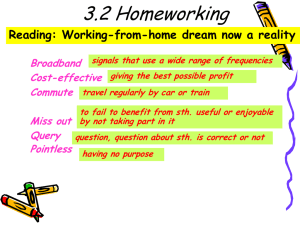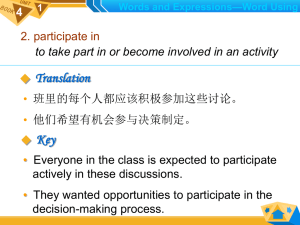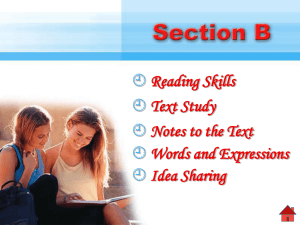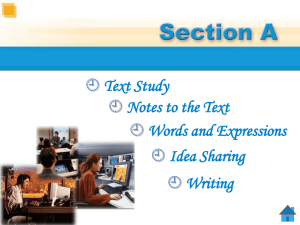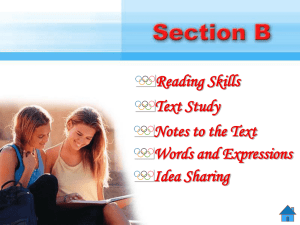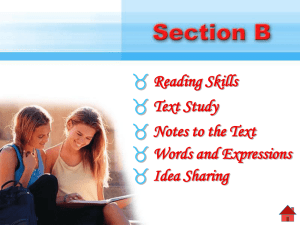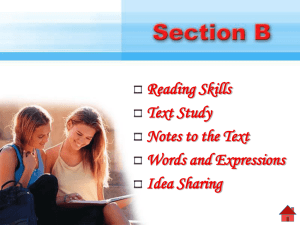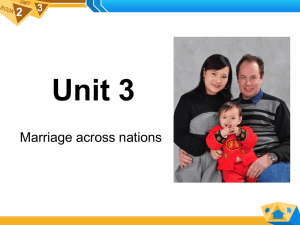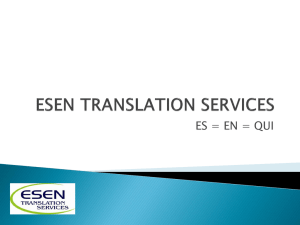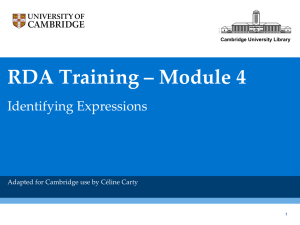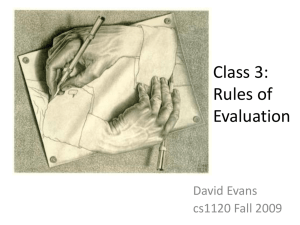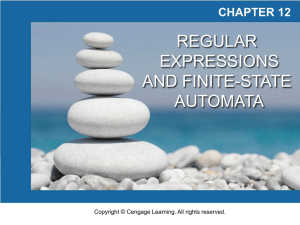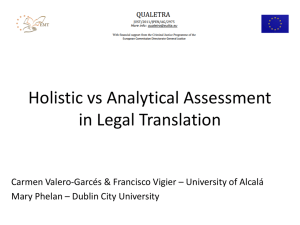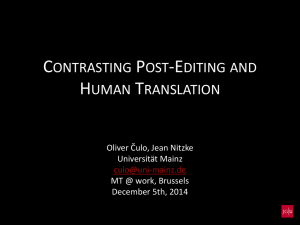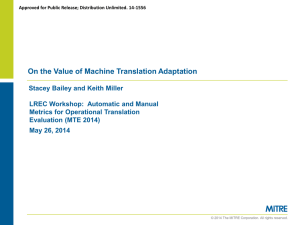Book2 Unit1
advertisement
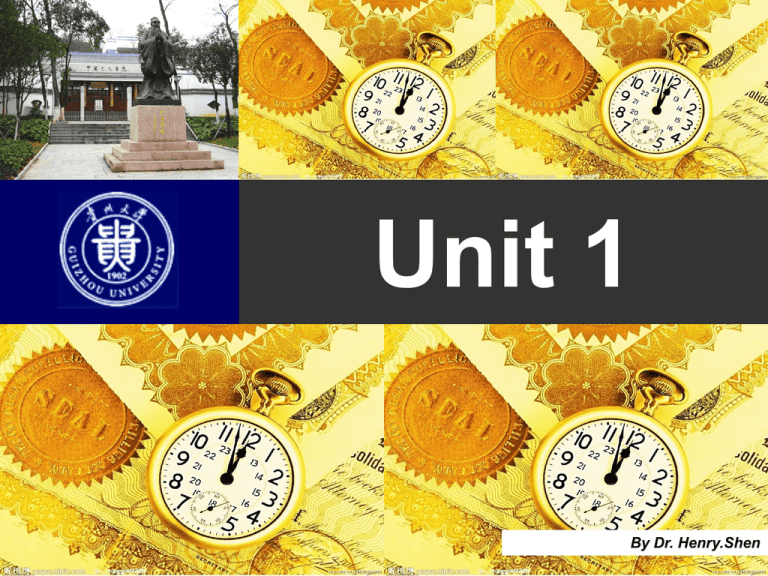
Unit 1 By Dr. Henry.Shen Section A Time-conscious Americans 注重时间的美国人 Section A Text Study Notes to the Text Words and Expressions Understanding Structure Analysis Summary Text Study—Understanding I. Understanding Answer the following questions: 1. What are the two things Americans try to save? Time and labor (Para. 1) Text Study—Understanding 2. What does time mean to Americans? a precious resource Time is regarded as ________________. (Para. 2) Text Study—Understanding 3. How do Americans do everything? 4. When do Americans start talking business? 5. How do Americans save time? in a rush • They do everything ________. quickly • They start talking business _______. • They work hard at the task of saving time a steady flow of laborby producing ______________________________ saving devices . (Paras. 3-7) _____________ Text Study—Understanding 6. What’s the conclusion? have different ideas The foreigners _________________ from those of American. (Para. 8) Text Study—Understanding To successfully solve a problem and to fulfill a job with speed is taken by __________ as a sign of The _________ consider it proper to ____________________ . Text Study—Structure Analysis II. Structure Analysis A. The Writing Model of the Passage: General Statement + Illustration + Emphasis • What is the General Statement ? • What is the illustration? • What does the writer emphasize? Text Study—Structure Analysis The general statement (Paras.1~2) • What does the writer want to tell us ? time-conscious . Americans are _____________ Text Study—Structure Analysis Illustration: (Paras.3~7) the foreigner’s first impression of the U.S Para.3: Everyone in the U.S. is in a rush. Para.4: Americans start talking business quickly. Para.5-7: Americans work hard to save time. Text Study—Structure Analysis Emphasis by contrast (Para.8) Americans take it as a sign of skillfulness to do things quickly, while the foreigners consider it proper to take time doing things. Text Study—Structure Analysis B. The way to develop paragraphs: General Statement + Specific Details + Reason The writer presents the general statement by giving specific details, then telling the reasons. 2 1 Text Study—Structure Analysis Work with your partner and find out the General Statement, the specific details and the related reason in Paragraph 3: Tips Text Study—Structure Analysis General statement: Everyone is in a rush — often under pressure _____________________________________. Specific details : city people, hurrying to … 1. _________________________________ working time, precious … 2. _________________________________ abrupt, people, push past … 3. drivers, _________________________________ The reason: This is because people value time highly __________________________________. Text Study—Structure Analysis Paragraph 7 is also developed in this way. Now pick out the general statement, specific details and the reason in it. Text Study—Structure Analysis General statement: The U.S. is definitely a telephone country _____________________________________. Specific details : everyone, telephone, conduct business … __________________________________ The reason : save, feet, time … 1. telephones, ___________________________________ 2. Telephone ___________________________________ service, superb, postal service, __________________________________ efficient … Text Study—Summary III. Summary Americans are time-conscious ____________ people. They value precious time and save it carefully. Time is a real, ________ count resource to them so every minute must _____. in a Foreigners may think Americans are always _____ hurry and under pressure. Smiles, short ____ conversations, and small exchanges with strangers wasting don’t exist because Americans dislike “_______” too much time. Americans assess others professionally rather than socially, so they ____________ Text Study—Summary start talking business immediately since they are conscious of time. Americans work hard at always _________ saving time by producing a steady flow of labor_______ saving devices. They may have meetings using equipment like television screens and telephones person . Solving a problem or doing rather than in ________ with speed is taken as a sign a job successfully __________ of _________. skillfulness The more important the job, the pour into it. more time and effort Americans will _________ Active Expressions Focus Study Notes to the Text—Active Expressions Find out the active expressions: 1. We are slaves to nothing but the clock. 2. They will miss the ritual interaction that goes with a welcoming cup of tea or coffee … 3. To us … has little or no relation to the significance of the matter at hand. 4. In America, too, a final agreement will normally be signed in person. Notes to the Text—Active Expressions Active Expressions 1. nothing but + n. / pron. / to do… ……只…… 2. go with sth. 伴随…… 3. at hand 在附近…… 临近的…… 4. in person 亲自,亲身 Notes to the Text—Active Expressions Translation 1. 他成天什么也不干,只知道睡觉。 2. 幸福未必伴随金钱而来。 3. 他写东西时,手边总放着一本字典。 4. 在中国,要开银行账户,需本人亲自去 银行办理。 Notes to the Text—Active Expressions 1. There he did nothing but sleep all day long. 2. Happiness doesn't necessarily go with money. 3. When he writes, he always keep a dictionary at hand . 4. If one wants to open a bank account in China, he must go to the bank in person. Notes to the Text—Focus Study II. Focus Study 1. Once the sands have run out of a person’s hourglass, they cannot be replaced. Once … , 一旦…… 便…… Notes to the Text—Focus Study Translation • 她一到我们就开始。 • 一旦染上坏习惯,想改掉就难了。 • Once she arrives, we can start. • Once you get into a bad habit, you'll find it hard to get out of it. Notes to the Text—Focus Study 2. … which though pleasant, take longer — especially given our traffic-filled streets. given + n./ that clause , 如果有……, 假如;考虑到…… Notes to the Text—Focus Study Translation • 考虑到他们缺乏经验,他们算做得很出色了。 • 如果照样再给他治疗一次,他肯定会痊愈。 • Given their inexperience, they’ve done a good job. • Given the same treatment again, he is sure to get well. Notes to the Text—Focus Study 3. … the telephone service is superb here, whereas the postal service is less efficient. whereas … , 却;而 paragraph Note: “whereas” is used to show the contrast. Notes to the Text—Focus Study Translation • 有些人喜欢肥肉,而有些人却不喜欢。 • 为什么有的癌症可用化学疗法治愈, 而有的癌症却一点都不受药物影响? • Some people like fatty meat, whereas others hate it. • Why are some cancers cured by chemotherapy alone, whereas others are unaffected by drugs? Word Using Matching Game Chinese to English Words and Expressions—Word Using I. Word Using 1. fall behind sb./sth. ① to become bit by bit further behind Translation 他在英语方面一直落后于同组同学。 Key He’s been falling behind his group members in English. Words and Expressions—Word Using 1. fall behind sb./sth. ② to fail to produce sth. at the proper time Translation 我工作拖下来了,我得想办法赶上。 Key I’m falling behind with my work; I must try to catch up. Words and Expressions—Word Using 2. result in to cause, to have as a result, to lead to Translation Acting before thinking always results in failing. Key 做事不先考虑总是会失败的。 Words and Expressions—Word Using 3. budget vt. ① to plan the spending of … Translation • 学校编列了一百万美元建新图书馆的预算。 • She is extremely busy, so she has to budget her time carefully. Key • The school budgeted one million dollars for a new library. • 她忙极了,所以必须好好安排时间。 Words and Expressions—Word Using 3. budget (for) vi. ② to save or spend money for … Translation 小两口为下一年定预算。 Key The young couple budgeted for the coming year. Words and Expressions—Word Using 3. budget n. ③ a plan to show how much a person will be able to spend Translation 量入为出是很重要的。 Key It is essential to balance one's budget. Words and Expressions—Word Using 3. budget adj. ④ inexpensive, cheap Translation 他以低廉的价钱买下这所房子。 Key He bought the house at a budget price. Words and Expressions—Word Using 4. account for ① to give a satisfactory explanation for … Translation 珍妮不得不向父亲说明每一个便士是怎么花的。 Key Jenny had to account to her father for every penny she spent. Words and Expressions—Word Using 4. account for ② to be a proportion of sth. Translation Girls account for half of the class. Key 女生占了我们班一半人数。 Words and Expressions—Word Using 5. replace vt. ① to put sth. back in its place Translation 她将听筒放了回去。 Key She replaced the receiver. Words and Expressions—Word Using 5. replace A with B ② to take the place of Translation • 电灯已经取代了蜡烛。 • 刹车需要更换。 • Key Human beings have replaced candles with electric lights . • The brakes have to be replaced. Words and Expressions—Word Using 6. count vi. If sth. counts, it’s important or valuable; Translation • 考试前,每一秒钟都很重要。 • 就运动而言,重要的不是赢,而是参与。 Key • Every minute counts before the exam. • In sport what really counts is not the winning but the playing. Words and Expressions—Word Using 7. convention n. customary practice 习俗,惯例 Use It • What’s the convention for men to wear on formal occasions? • What’s the convention for Chinese wedding? Tips • • It’s the convention for men to wear suits on formal occasions. It’s the convention for … to … Words and Expressions—Word Using 8. assess vt. to judge or decide the amount, value, quality or importance of… Translation • 现在来评价新法规的效果为时尚早。 • 事故后警察确定了损害赔偿金额。 Key • It is too early to assess the effects of the new legislation. • The police assessed damage after the accident. Words and Expressions—Word Using 9. much less still less, let alone and even less likely Translation He can hardly afford beer, much less champagne. Keys 他连啤酒都喝不起,更不用说香槟了。 更别提 Words and Expressions—Word Using 10. be worthy of deserving 值得 Use It What is worthy of your working hard? Reference … is worthy of our working hard. Words and Expressions—Matching Game II. Matching Game c superb __ f budget __ d acute __ e skillful __ b restlessly __ a conduct __ a. carry out b. impatiently c. excellent, outstanding d. fine, sharp e. having or showing ability to do sth. well f. plan the spending of Words and Expressions—C to E III. Chinese to English 停滞不前 消磨时间 要价 承受压力 生活节奏 开场白/寒暄 礼节性交往 邮政服务 金钱的奴隶 直接接触 • • • • • • • • • • stand still kill time charge (money) for sth. be under pressure pace of life opening exchanges ritual interaction postal service slave to money personal contacts
